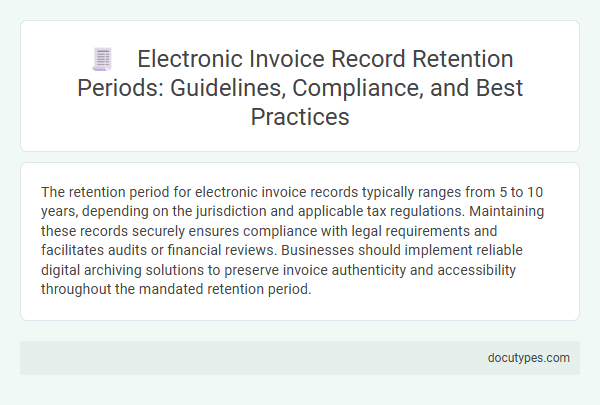The retention period for electronic invoice records typically ranges from 5 to 10 years, depending on the jurisdiction and applicable tax regulations. Maintaining these records securely ensures compliance with legal requirements and facilitates audits or financial reviews. Businesses should implement reliable digital archiving solutions to preserve invoice authenticity and accessibility throughout the mandated retention period.
Understanding Electronic Invoice Records
| Aspect | Details |
|---|---|
| Definition | Electronic invoice records are digital documents that capture transaction details between buyers and sellers, including invoice numbers, dates, amounts, and tax information. |
| Retention Period | The retention period for electronic invoice records typically ranges from 5 to 10 years, depending on jurisdiction and regulatory requirements. Tax authorities often mandate maintaining these records for audit and compliance purposes. |
| Regulatory Compliance | Electronic invoices must comply with legal standards for digital record-keeping, including data integrity, security, and accessibility throughout the retention period. |
| Importance of Retention | Maintaining electronic invoice records for the appropriate duration safeguards against legal disputes and supports financial audits. Your business should implement secure storage solutions that ensure records remain unaltered and accessible. |
| Best Practices | Use reliable digital archiving systems with backup capabilities to preserve electronic invoice data. Regularly review retention policies to align with evolving legislation and industry standards. |
Key Regulations Governing Invoice Retention
The retention period for electronic invoice records is governed by specific regulatory requirements to ensure compliance and audit readiness. Understanding these key regulations helps businesses manage their digital financial documentation effectively.
- Tax Authorities' Requirements - Many jurisdictions mandate retaining electronic invoices for a minimum of 5 to 10 years to comply with tax auditing standards.
- Data Protection Laws - Regulations such as GDPR emphasize secure storage and limited retention of electronic invoice data to protect personal information.
- Financial Reporting Standards - Accounting frameworks require companies to preserve electronic invoices to support financial statements and legal verification processes.
Standard Retention Periods by Jurisdiction
The retention period for electronic invoice records varies by jurisdiction, typically ranging from 5 to 10 years. In the United States, the standard retention period is generally 7 years according to IRS regulations. The European Union mandates a minimum retention period of 10 years under VAT compliance rules.
Compliance Requirements for E-Invoice Storage
The retention period for electronic invoice records varies by jurisdiction but typically ranges from 5 to 10 years. Compliance with local tax authorities' regulations ensures your electronic invoices remain valid and accessible during audits.
Proper storage methods must guarantee data integrity, confidentiality, and retrievability throughout the retention period. Failure to comply with e-invoice storage requirements can result in penalties or legal complications.
Best Practices for Electronic Recordkeeping
What is the retention period for electronic invoice records? Electronic invoice records should generally be retained for at least seven years to comply with tax regulations and audit requirements. Proper retention ensures easy access to records for verification and supports accurate financial reporting.
What are the best practices for electronic recordkeeping of invoices? Using a secure, organized digital storage system with regular backups protects your invoice data from loss or corruption. Implementing clear indexing and searchable metadata helps streamline retrieval and maintains compliance with legal standards.
Security Measures in Invoice Retention
The retention period for electronic invoice records typically ranges from 5 to 10 years, depending on local regulations and industry standards. Security measures such as encryption, access controls, and regular backups are essential to protect these records from unauthorized access and data loss. Ensuring compliance with these practices helps you maintain the integrity and confidentiality of your electronic invoices throughout the retention period.
Digital vs. Physical Invoice Retention
The retention period for electronic invoice records typically ranges from 5 to 7 years, depending on legal and tax regulations in your jurisdiction. Digital invoices must be stored securely to ensure their authenticity and accessibility throughout this period.
Physical invoice retention usually demands more space and is susceptible to damage, making digital storage a more efficient solution. You should consider transitioning to digital records to simplify compliance and improve record management.
Audit Readiness and Record Accessibility
The retention period for electronic invoice records varies by jurisdiction but typically ranges from 5 to 10 years to ensure compliance. Proper retention supports audit readiness by maintaining accessible, accurate, and complete records.
- Audit Compliance - Retaining electronic invoices for the mandated duration helps meet legal and tax authority requirements.
- Record Accessibility - Records must be stored in a way that allows quick retrieval during audits or financial reviews.
- Data Integrity - Secure storage of electronic invoices preserves authenticity and prevents unauthorized alterations.
Your electronic invoice retention strategy should prioritize regulatory adherence while enabling efficient audit processes.
Common Mistakes in Invoice Record Management
The retention period for electronic invoice records typically ranges from 5 to 10 years, depending on jurisdiction and tax regulations. Proper management of these records ensures compliance and facilitates audits.
Common mistakes in invoice record management include failing to back up electronic files, leading to data loss during system failures. Organizations often neglect to archive invoices systematically, causing difficulties in retrieval when needed. Misunderstanding legal retention requirements can result in premature deletion or excessive storage, both of which carry financial and regulatory risks.
What Is the Retention Period for Electronic Invoice Records? Infographic

